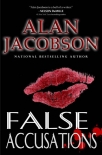False Accusations by Jacobson, Alan (most inspirational books of all time TXT) 📗

Book online «False Accusations by Jacobson, Alan (most inspirational books of all time TXT) 📗». Author Jacobson, Alan
“The aggression in this case was focused against Dr. Phillip Madison, a well-respected surgeon in this community. And what did he do to deserve this aggression? Well, nothing, any reasonable person would conclude. But the defendant took exception to having lost her job due to her own inadequacies, and held it against Dr. Madison. While most of us would simply have gotten angry, maybe yelled a bit, written a nasty letter...the defendant sought revenge. She came forward with a bogus rape complaint—you heard the lack of evidence—and when she tried to extort money from him, an attempt which ultimately failed, she cranked up the stakes of revenge a bit more. She tried to turn his wife against him.
“But she didn’t stop there. She stole his car and went to the streets of our community in an attempt to commit murder, all the while setting the situation up as if Dr. Madison had done it in a drunken stupor. But she didn’t figure on one thing: the fact that our investigative process is largely assisted nowadays by science: in this case, DNA, saliva, and lip print analysis. She didn’t know that we would be able to extract her saliva and genetic code—a fingerprint, if you will, off the beer cans she planted in his car in an attempt to implicate him.
“She tried to fool the police. She tried to fool me. She tried to fool you, ladies and gentlemen. But it didn’t work, did it? No, we saw her for who she is, and what she’s about.
“I ask you to look carefully at the evidence, at the defendant’s state of mind, at her character, at the witnesses who have testified before you under oath. You have to ask yourself: did the defendant have the ability to commit this heinous crime? Let’s look at it first from a physical perspective. This crime did not require any unusual amount of strength—just an unusual amount of gall. Leeza Madison noticed that her keys to her husband’s car and garage were missing shortly after the defendant was in their home. Dr. Madison testified that he’d fallen asleep watching the evening news—the same statement he’d made to the police when they first began their investigation—so he never did get to arm his house alarm. So I ask you, was it possible for Brittany Harding to walk up to the garage, a separate structure that was on the opposite side of the three-story house from Dr. Madison’s bedroom, unlock the door with the key, start his car, and drive off? I believe the answer is obvious. Did she take a chance that the alarm was already set? Most definitely. But did she even know that there was an alarm?
“There was no way for the defendant to know. At the very least, she was taking a chance. But that requires levelheaded, prudent, objective thought processes, and I remind you that as the psychiatrist, Dr. Hall, testified, revenge is an act of desperation, and involves obsessive behavior. She was fixated on one goal: revenge against Dr. Madison. So in this instance, it was not just a matter of whether or not she was able to kill these two people, it was whether or not the defendant exercised prudence in weighing the reward of revenge against the consequences of getting caught. Clearly, as Dr. Madison and Mark Stanton, her former employer, testified, she has established a pattern of seeking the reward of revenge over the risk of retribution.
“Then there is the issue of the market incident. Ronald Norling, the grocery clerk, was only interested in telling the truth of what he had seen and heard. He doesn’t know Dr. Madison or Miss Harding—he has no ax to grind, no bias, if you will, whatsoever. We know why the defendant did what she’s accused of doing because, aside from the physical evidence implicating her, she told us what she was going to do. She made her intentions quite clear. The last time she threatened to do something—when she accused Dr. Madison of rape and screamed that she was going to go to the police and make him pay—she did just that. And when she screamed at him in a crowded market that she would make him pay and get even with him—she did just that. Or tried to.
“Ladies and gentlemen, what more do we need? I would submit that we don’t need anything more to establish guilt on the part of the defendant.
“But we do have more. We have scientific evidence that underscores her involvement in this act of violence. Oh, the defendant’s attorney will tell you that just because her genetic fingerprints are on the beer cans found in the car does not mean she was driving it. That’s true. But I ask you, who else would have been driving it? Why would the defendant’s genetic fingerprints be found on beer cans inside the car if she were not a party to this crime?
“And I remind you that the only eyewitness to the aftermath of this murder said that he saw a Chicago Cubs hat on the driver of the vehicle as it passed by him. Such a hat was found in the defendant’s home, because she’s a longtime fan of the team. And I remind you, this is not Chicago. There aren’t a plethora of Cubs fans in Sacramento, California.”
Denton paused, walked a few steps over to the prosecution table. He leaned back against the front edge of it and crossed his arms on his chest. “In my opening statement, I asked you all to concentrate on the facts of the case and on what the witnesses had to say. I told you that if you did that, and





Comments (0)